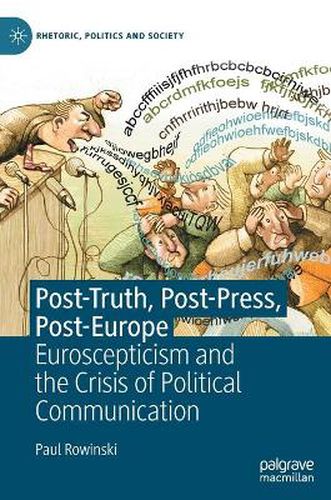Readings Newsletter
Become a Readings Member to make your shopping experience even easier.
Sign in or sign up for free!
You’re not far away from qualifying for FREE standard shipping within Australia
You’ve qualified for FREE standard shipping within Australia
The cart is loading…






This title is printed to order. This book may have been self-published. If so, we cannot guarantee the quality of the content. In the main most books will have gone through the editing process however some may not. We therefore suggest that you be aware of this before ordering this book. If in doubt check either the author or publisher’s details as we are unable to accept any returns unless they are faulty. Please contact us if you have any questions.
This book explores whether a beleaguered press in recent years has been developing an emotive, Eurosceptic post-truth rhetoric of its own - competing for attention with populist politicians. These politicians now by-pass the media, talking directly to their publics in blogs, on Twitter and Facebook. In the post-truth age, objective facts are less influential in shaping opinion than appeals to emotion. Audiences congregate around views they share and want to believe. The author presents a critical discourse analysis of the language used by populist politicians online, on Facebook, and subsequently quoted in the press, which highlights how the political rhetoric of Italian and British politicians is often at its most inflammatory around the issue of immigration. The same goes for the press. The Italian case study focuses on media coverage of the 2014 and 2019 European elections and 2018 general election. The British case study examines press reporting of the 2016 UK referendum on EU membership, the 2017 general election, and the September 2019 parliamentary debate immediately following the UK Supreme Court ruling that proroguing of Parliament was illegal. From the picture that emerges, the author argues that journalists need to change how they report, to challenge the post-truthers, holding them to account and pressing them on the facts while also harnessing the emotions of disaffected publics.
$9.00 standard shipping within Australia
FREE standard shipping within Australia for orders over $100.00
Express & International shipping calculated at checkout
This title is printed to order. This book may have been self-published. If so, we cannot guarantee the quality of the content. In the main most books will have gone through the editing process however some may not. We therefore suggest that you be aware of this before ordering this book. If in doubt check either the author or publisher’s details as we are unable to accept any returns unless they are faulty. Please contact us if you have any questions.
This book explores whether a beleaguered press in recent years has been developing an emotive, Eurosceptic post-truth rhetoric of its own - competing for attention with populist politicians. These politicians now by-pass the media, talking directly to their publics in blogs, on Twitter and Facebook. In the post-truth age, objective facts are less influential in shaping opinion than appeals to emotion. Audiences congregate around views they share and want to believe. The author presents a critical discourse analysis of the language used by populist politicians online, on Facebook, and subsequently quoted in the press, which highlights how the political rhetoric of Italian and British politicians is often at its most inflammatory around the issue of immigration. The same goes for the press. The Italian case study focuses on media coverage of the 2014 and 2019 European elections and 2018 general election. The British case study examines press reporting of the 2016 UK referendum on EU membership, the 2017 general election, and the September 2019 parliamentary debate immediately following the UK Supreme Court ruling that proroguing of Parliament was illegal. From the picture that emerges, the author argues that journalists need to change how they report, to challenge the post-truthers, holding them to account and pressing them on the facts while also harnessing the emotions of disaffected publics.